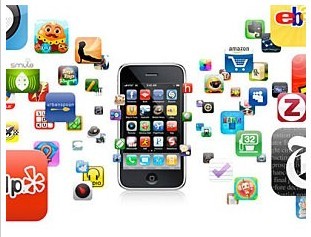 Many people still ask: "What is a phone app?" The answer may surprise you - it's simply a software program in disguise.
Many people still ask: "What is a phone app?" The answer may surprise you - it's simply a software program in disguise.Short for "application," these bite-sized offerings (often less complex and feature-laden than counterparts for desktop or laptop computers) are designed for download directly onto connected mobile devices. Retrieved by connecting to so-called "app stores," or online software distribution portals, most selections are obtained directly from your cellular handset.
Applications Explained
Popular vendors including Apple's App Store, Google Play and the Windows Phone Marketplace make it easy to purchase or grab literally hundreds of thousands of free choices on-demand. So long as you're attached to the Internet via a wireless connection, retrieving them takes just seconds... However, some larger-sized files may require access to a WiFi hotspot or home network.
Think of "smartphones" as portable, pocket-sized PCs, capable of running programs just like any set-top system. Phone apps are merely the form of software they run - and popular selections often include mobile versions of favorite choices found on other devices and operating systems.
Capable of adding endless functionality to your phone, apps allow handsets to function like a veritable Swiss Army knife. Available in countless forms, they can help you do everything from build grocery lists to track travel expenses, make calls digitally or even tell what song is playing on the radio just by holding up your mobile device's microphone.
Installing an App
Many apps, e.g. calendars, phone books and day planners, come preinstalled on cellular phones. Others simply require that you setup an account, sign into app stores from your handset and click on the "Install" or "Purchase" button, at which time they automatically begin downloading and installing on the device.
In select cases, such as with Android handsets, you can also visit websites to initiate transfer by clicking on a button from your Internet browser. Other times, i.e. with Apple devices, it's also possible to make purchases from your desktop computer, then add applications to handsets when devices synchronize with iTunes using a USB cable. Some "cloud computing" (online storage and processing) services even keep track of purchases and automatically populate new acquisitions simultaneously across multiple gizmos including tablet PCs and desktop computers.
Whichever your preferred choice of app - i.e. Netflix or HBO Go for streaming videos, or Pandora or Spotify for listening to Internet radio broadcasts - obtaining it is a simple process. Many software makers even list links directly to relevant product app store listings on their websites.
What Makes Apps Unique?
Given away free or commonly priced from $0.99 - $14.99 (most average $1-$3), apps are essentially portable and streamlined versions of everyday software programs designed for use in mobile fashion. Many take advantage of the technical features built into powerful handsets such as the iPhone 4 or Samsung Galaxy S3, letting you videoconference, share photos to social networks or control gadgets by using voice commands.
However, phone apps have become so popular - and such a part of today's cultural lexicon - that the term is actually starting to replace its progenitor. Consider Apple's Mac App Store, which actually offers several full-priced software packages identical to boxed retail editions, but sold as "applications," because shoppers equate the term with experiences that are more intuitive and user-friendly.
So when experts say "there's an app for that," they're not kidding: Even if it's not always labeled exactly as such.
Source From:http://tech.lifegoesstrong.com/article/what-phone-app
没有评论:
发表评论